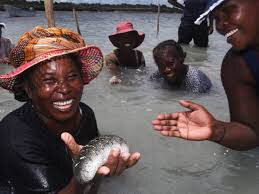The COVID-19 epidemic, and the measures taken to combat it, are proving increasingly challenging for men and women active in the African artisanal fisheries. Restrictions to the assembling of people, the circulation of people and goods, and the closing down of traditional markets for artisanal fisheries products, are making access to fish difficult to the neediest.
Because of the lack of facilities and equipment, maintaining the hygiene to fight the epidemic is also complicated on board the vessels, in fish landing sites, processing sites and markets. Women in African artisanal fisheries are particularly hard hit as they earn a living on a day-by-day basis.

“The Covid 19 crisis must be an opportunity to respond to the long-standing challenges in artisanal fisheries and to improve the hygiene and working conditions of the men and women in the sector in the long term"
Gaoussou Gueye - President of CAOPA
improved working conditions
Artisanal fishing professional organisations have taken action: this crisis should be an opportunity to improve sanitary and working conditions for men and women in the long-term. We support them in:
Raising awareness about the working conditions in the artisanal fisheries value chain, especially for women in the fish processing sector;
Advocating that countries ratify and implement the ILO Convention 188 which covers workers at sea and the FAO Voluntary Guidelines for Securing small-scale fisheries which covers the whole value chain; and
Demanding more participation of artisanal fisheries in decision-making processes that have an impact on their livelihoods.
Coronavirus crisis micro-blog
In some parts of the island, without buyers, prices have fallen to one-tenth of normal.
Artisanal fishermen worried about the consequences of the government’s ban on red snapper exports.
The restriction of movements between several counties and the decline of tourism have strongly affected activities throughout the fish value chain.
Ivorian women processors continue to warn of the effects of the pandemic on the fish value chain and call for help from their government and the European Union.
An angry mob destroyed the police commissariat and a health center following the notice of shifts to go out to sea in Tombo.
Checkpoints and restrictions for Ivorian customers are some of the challenges for fishing communities. With reporting by Nana Kwame Darko.
Senegalese fish processors have actively taken steps to fight against the spreading of the virus, most of them with their little savings.
The small-scale fisheries sector continues its activities even though the impact and losses are high, a report by George Harris.
Measures to prevent the spread of the COVID-19 have a strong impact on small-scale fisheries. Reporting from Conakry by Mamadou Aliou Diallo.
APRAPAM, GAIPES and CONIPAS continue protesting against the government’s intentions with a video and an online petition.
After weeks of meetings with the authorities, they suggest a plan to improve working conditions for women fish processors.
In midst of snoek season, regulation allows fishermen to travel and to register their accommodation to overnight.
A digital platform connects consumers to fishermen and partners with other food startups to share costs on delivery.
CAOPA sent a letter to governments and IOs reminding them of the importance of the sector for food security.
The ministry of Fisheries set up a three-month rescue plan for the whole fish supply chain to make sure it does not fall apart.
Through a letter to their minister, they also underline the importance of the sector for food security and employment.
A commission will oversee the process from the reception of the donations by the operators to the shipment to Nouakchott.
Due to restrictions and mistrust, the population does not buy Chinese imported tilapia anymore and opts for local products.





















CAOPA calls on African governments to ratify ILO Convention 188 on Work in Fishing and the FAO Voluntary Guidelines for Securing Small-scale Fisheries.